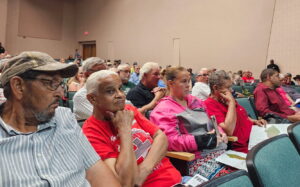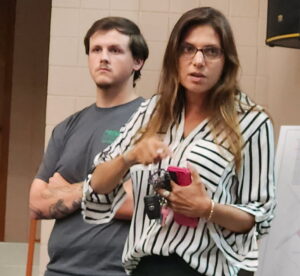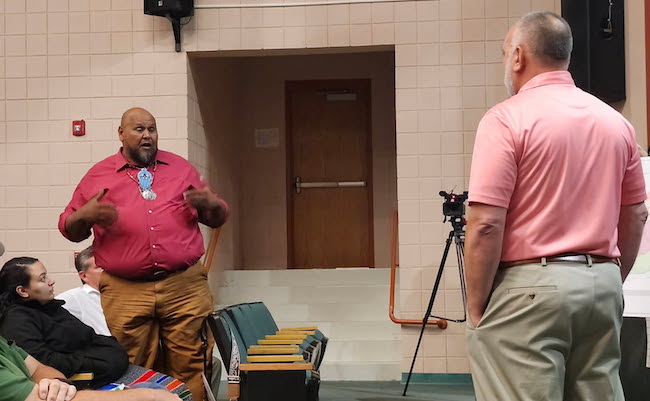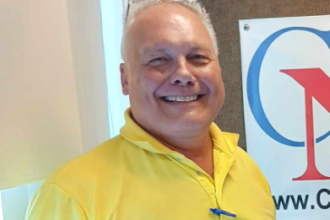Around 200 people turned out Tuesday to speak out against a planned development for Old Lake Road between Lake Waccamaw and Buckhead.
Bay Branch LLC wants to build 4,531 homes on 1,000 acres between Union Chapel Baptist church and the Forest Service firetower. The firm submitted an initial plan to te planning board as part of a rezoning request to change the property from mixed use agriculture to Planned Unit Development (PUD). The plan was forwarded to county commissioners with a favorable endorsement. Commissioners have taken no action on the request.
Andy Wells of Colliers Engineering and Design told the crowd at East Columbus High School that the development is in its earliest stages. He answered questions from the group at Tuesday’s meeting, representing the development company.
“This meeting tonight,” he said, “there are no governmental officials here. There’s no planning board, no council, no commissioners.”
Mills said the planning board requested the developers hold an informational meeting. Notices of a March 3 meeting went out to residents within 1,000 feet of the property lines. A handful of landowners attended that meeting. More turned up for the planning board meeting that sent the plan to commissioners.
“Please don’t shoot the messenger,” he said, drawing laughter from some in the crowd. “I’m the engineer. I’m working on this project. It’s my job to meet all the requirements were it can get through the zoning.”
Colliers is responsible for designing the project to meet county standards for rezoning to a planned development, he explained. He said the plan takes into account ten year flood events, as well as providing a 30 foot wooded buffer and capture ponds to help prevent stormwater runoff into Slap Swamp and Friar Swamp. Both waterways feed Big Creek, which is a main tributary for Lake Waccamaw. The property is surrounded by state Gamelands, and has around 89 acres of dedicated wetlands that would have to be mitigated for the development to proceed. No lots would be built near the wetland areas, Mills said.

He noted that before the final engineering process could begin, the firm would have to meet U.S. Army Corps of Engineers wetland requirements; investigate and document any historical or historical features such as cemeteries or Native American sites; conduct environmental reviews for contaminant, underground tanks and other hazards; and take steps to prevent any endangered species.
“We have to design around endangered and threatened species,” he said.
He said the company will “comb the entire property” to research whether there is anything of significant historical or cultural importance in the area.
“All these things have to be done first,” he said, “before any machinery can move on the site.”
Lake Waccamaw native Jim McNeil said that the property in question was underwater in Hurricanes Floyd and Florence, and has experienced significant flooding in other years.
“That hundred year flood plain doesn’t mean diddly,” he said.
Adding “more homes than Whiteville and Tabor City put together”, along with hard surface roads and other impermeable features, would drastically increase runoff into Lake Waccamaw, endangering the lake habitat.
Tapping into the groundwater to provide water for the development would drastically alter the lake, McNeil said,. He noted that construction of the St. James community in Brunswick County caused the springs at Boiling Springs Lake to cease flowing.
“There are no more boiling springs at Boiling Springs Lakes,” he said. “They’ve all been drained to water golf courses at St. James…” He noted that logging in the Green Swamp dropped the level at Lake Waccamaw to the point that officials built the dam to preserve the lake. The main line canal though the Green Swamp led to the loss of most Artesian wells, known as flows, in the area, dropping the water level from six to 18 feet.
“Every time the aquifer gets tapped in Southeastern North Carolina, from Tar Heel to Brunswick County, it affects the groundwater levels,” he said. Removing 15,000 gallons of groundwater per month would disrupt the springs as well as the natural chemistry and flow of water in the lake, he said. If you go and drop this water table to the point that there’s no more spring water coming into the lake, then this beautiful lake you are trying to sell these people will be a sewer.”
Mills said he has not been “Privy to a lot of stuff you’re talking about,” referring to the effects on the lake, but his staff was on hand taking notes to look into those same concerns.
Chief Mike Jacobs of the Waccamaw Siouan tribe said the project is “about a mile from the Buckhead community as the crow flies.
“Slap Swamp is the headwaters for Big Creek,” he said. “When we have this runoff, and we will have this runoff, … then Slap Swamp is going to have more flooding problems. We’re already having problems in our community. We have not been contacted.
“There is a native burial ground less than a quarter mile from the property line…No telling what else is in there….
“Once you bring something like this in our area, the damage is done. you cannot fix what you have already broken. You’ve got to understand. This is more than a pine tree and a creek. My family has been here for millennia. This is my home. When you start changing someone’s home, it changes the aspects of everything.”
He noted that out of control growth in New Hanover and Brunswick counties are running the Cape Fear River
“You can’t back up on the damage that’s already done. The Cape Fear river is dying,” Jacobs said. “You want to see the same thing happen to Lake Waccamaw, after the millions of dollars that have been spent to return it to the pristine state?”
Jacobs also said that the swamps and wetlands around the property make flooding impossible to avoid.
“Ain’t no mound of dirt, not enough stone, not enough rock,” he said. “You can put it on paper, but you can’t put it in God’s plan.”

Samira Davis of Lake Waccamaw is a real estate agent and disaster volunteer. She asked if there were any members of the development group there other than Mills. When he said there were not, Davis asked the crowd to take note.
“It’s important enough that we all showed up,” she said, “but let the record reflect the people who are going to make all the money and walk out, they aren’t here.”
A number of other speakers expressed concerns over traffic congestion, water and sewer, and the effect on area schools.
Commissioner Laverne Coleman will host a meeting at Lake Waccamaw First Baptist Church Thursday at 7 p.m. to discuss the county’s role in the project. The public is welcome.







